From doctoral students to donkeys
26 July 2022
Professor Emeritus Jane Kelsey delivers her valedictory lecture on 28 July 2022 as she closes a chapter that has spanned four decades.
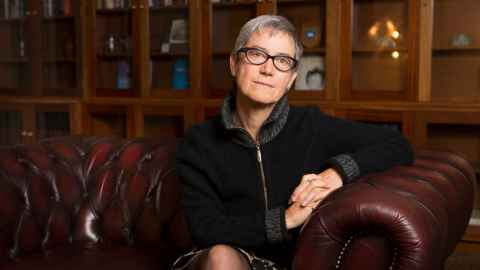
As Professor Emeritus Jane Kelsey and I begin a conversation about her career as one of the country's leading critical legal intellectuals, the academic landscape, speaking out publicly, and her 'retirement', she tells me she's now the chairperson of a small donkey committee.
Next door to her home, as she attempts to show me through her computer screen, is a reserve where seven donkeys reside.
"Big things are happening in the donkey committee. In fact, there are two separate groups and part of my job is to merge them, so I'm engaged in restructuring. I'm trying to diplomatically tiptoe my way around not offending anyone," she tells me.
Quirky isn't one of the descriptors that come up when learning about the academic activist and critic, and it's a refreshing discovery.
Meanwhile, Jane's friends and colleagues might say she's not one to tiptoe around anything, particularly in areas where she has actively fought to create change.
Her valedictory lecture this week, titled Truth to Power: the Legal Academic as Licensed Subversive, delves into the role and responsibilities of legal scholars as active members of societies, focusing on four core areas of her activism – decolonisation and te Tiriti o Waitangi; the political economy of public policy; globalisation; and the quasi-constitutional role of universities as public institutions.
Jane argues that critical scholars need to take teaching and research beyond lecture theatres, academic conferences and scholarly journals and apply academic skills, knowledge and power to advancing transformative justice. This is something she worked hard to do for four decades, and it's what one of her mentors, Ranginui Walker, termed academic activism.
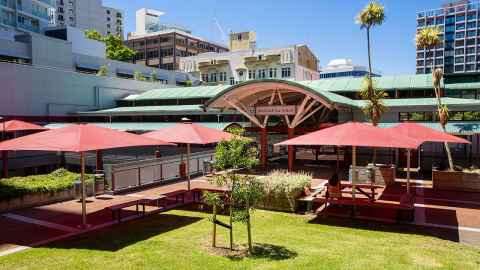
Jane is one of the country's most well-known critical academics and works internationally as an analyst, adviser and media commentator on globalisation, especially international trade and investment agreements.
Since her final day with the University last December, Jane has been working practically seven days a week on multiple projects, many of which are pro bono.
A major focus has been implementing the outcomes of the Waitangi Tribunal inquiry into the Trans-Pacific Partnership Agreement, which included setting up a new body, Ngā Toki Whakarururanga, to enable effective Māori influence on trade negotiations. Kelsey has been the technical adviser to that group and has worked on a range of negotiations, including the NZ-UK free trade agreement.
She's also worked actively with developing countries on technical analysis and strategy around the reform of the World Trade Organisation, and just finished a report for a Pacific non-governmental organisation that critiques a Pacific e-commerce strategy promoted by donor countries such as Australia.
"I have been able to focus on where I think my particular knowledge and skill base can have the most useful impact," says Jane, who taught at the University of Auckland from 1979, specialising in socio-legal studies, law and policy and international economic regulation.
Early days
Jane's father was a public servant in the tourism sector, and as a result, her family moved between Auckland, Sydney, Wellington and Melbourne.
One of the things about constantly moving, she says, is that you learn to be independent and resilient.
After finishing school, a career in law wasn't what Jane envisioned for herself, but her idea of an arts degree to study sociology and politics was deemed a waste of time by her dad who suggested law.
A lot of critical legal thinking was emerging at Cambridge in feminist criminology, Marxist criminology, and more traditional stuff.
After Jane's undergraduate law degree at Victoria, she pursued a postgraduate bachelor of civil law at Oxford at a time when most international scholarships were not open to women and most colleges were still segregated.
"I was originally going to do a PhD, but I was actually more interested in doing the courses there. I lived in an old manor called Hollywell where there was a real mix of international students from all disciplines, which was great."
Jane finished the two-year degree in one and went on to pursue a master of philosophy in criminology at Cambridge, where she found a fertile academic environment brimming with inspiring, questioning minds.
"This was a very interesting time in the UK. A lot of critical legal thinking was emerging at Cambridge in feminist criminology, Marxist criminology, and more traditional stuff."
Then in 1979, a position at the University of Auckland for a lecturer in criminology opened up and Jane was accepted.
A bastion of patriarchy
The University, particularly the law faculty, was a bastion of patriarchy in those days, says Jane, but thankfully there were several remarkable women on staff.
"These women, of course, had to be superheroes to be employed and navigate that environment while also caring for children.
"Now we have many women who have broken through that glass ceiling, but they typically still bear the brunt of family responsibility. It has undoubtedly changed, but there's still a long way to go."
In her early days with the University, Jane says women on the faculty struggled to attain promotions within the patriarchal and hierarchical environment.
Also when Jane joined the University in 1979, there were no Māori staff on the faculty and just a few Māori students.
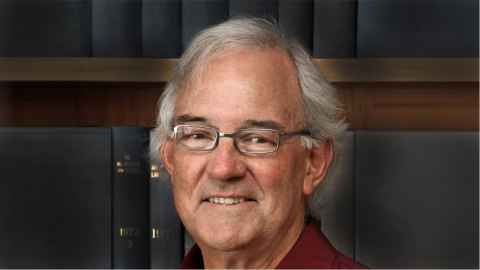
In the mid-1980s, Jane convened an access to justice consultation around the country, which led her to work closely with the late Moana Jackson, and she and law scholar David Williams set about revising the first-year legal system course, which was at the time taught in a very orthodox, legalistic way.
"It's always been a battle for Māori academics to get a space in the faculty and certainly to pursue Tikanga and te Tiriti content other than on the margins, so the current moves from the Council for Legal Education to introduce Tikanga into courses is both a major step forward but also a real worry in that it's being promoted before they have built the necessary foundations, timeframe or process for achieving it," she says.
"Discussions are just taking place now that should've taken place from the beginning. There's movement, but it's a long way from being in the right space."
During her early years, Jane says that although the University was a very conservative institution, it was also progressive in some ways and strongly defensive of many aspects of academic freedom.
While the University was hierarchical, it had a governance structure and system that enabled genuine participation in decision-making, says Jane.
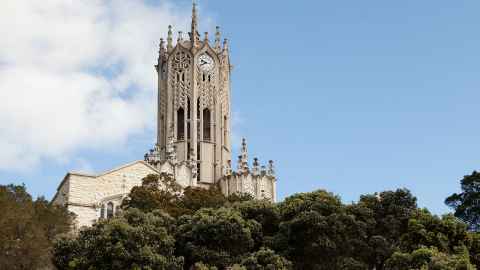
"It was very different from the current managerialism that there is in universities today with the multiple layers of senior management.
"At that time, the senate, faculties, and departments were places of real debate, and decision-making occurred there on matters that now have been taken out of the realm of academia. We had debates regarding university links with apartheid and with South Africa. You couldn't imagine a debate like that happening now.
"University governance was a fertile place for debating our role as a university, and as academics, we advised council. I was a sub-professorial representative on the senate and the senate's role was to advise council, which at that time was well informed about the University. This was before we had the separation of governance and management."
The union was also extremely strong in those days and being on the branch of the Auckland union was a significant part of career progression.
In the late 90s, Jane became the national president of the Association of University Staff and played a prominent role in resisting some of the then government's policy moves to privatise aspects of universities.
The stop Kelsey campaign
I was written about in the National Business Review in an extremely derogatory way – what I did was not considered to be legal scholarship.
Right from the start, Jane had strong defenders in a number of faculties who might not have agreed with what she was saying but who fiercely defended her right to say it.
And after close to 20 years at the university, during which time Jane became known as a spokesperson and activist on issues of neoliberalism and globalisation, she was made a professor, but not by the Faculty of Law as was the typical route at the time.
"There was an active campaign, the 'Stop Kelsey Campaign' by the male hierarchy in the Law School to stop me from becoming a professor. I was written about in the National Business Review in an extremely derogatory way – what I did was not considered to be legal scholarship."
Despite the lack of support from some colleagues within her faculty, the University conferred on her a personal chair with the support of various professors in several other faculties and the approval of an international reviewer eminent in Jane's field.
"When it was announced, the faculty didn't know, so my opponents couldn't intervene to stop it. That broke the ground at Auckland."
Speaking out
Jane, who has been awarded two Royal Society Marsden Fund grants and has written a number of books, including The Fire Economy, New Zealand's Reckoning, has regularly spoken out publicly over the years in line with her views on academics as public intellectuals.
Academic activism in Aotearoa must be informed by te Tiriti, she says.
In the early years, Jane worked with a group called the Auckland Committee of Racism and Discrimination, which carried out the initial exposé into abuses in welfare homes, and she would often speak to the media about their findings.
"After 1984, I worked on the neoliberal "revolution", which was highly controversial, and I did a lot of media and interviews around that. I've never been shy of the media, but I have always had a rule that I won't talk about something I don't know about, which isn't always the case with academics."
Speaking out and sharing research and thought leadership is a fundamental part of an academic's role as a public intellectual, says Jane, who, despite having a strong public voice, is a very private person. This, she says, is one of the ways she has survived as a critic in the public domain.
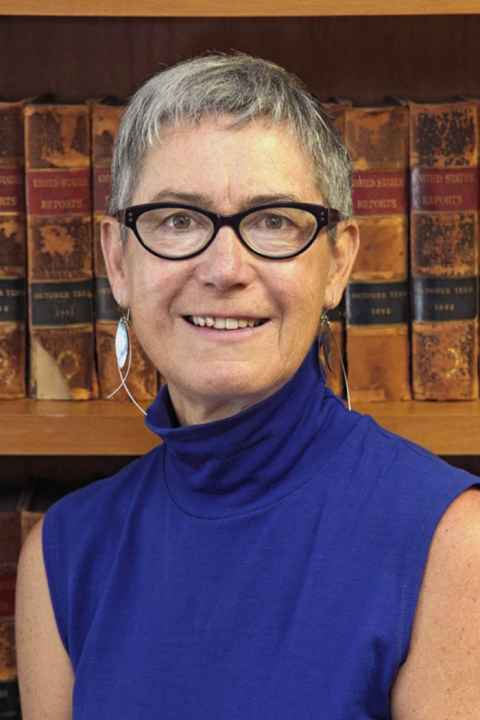
"The fundamental rule is that you remain focused on the issues and stay away from personalised attacks. I don't do social media, I don't even have a webpage.
"If you're going to talk truth to power, you need to think strategically, anticipate what you will confront, and set up support systems to work through it. People have different ways of navigating obstacles to remain principled in how they respond."
Academics, says Jane, have not just a privilege but a responsibility to perform those roles.
"Just as the media was supposed to be the fourth estate, universities have a public good and public intellectual responsibility. That's why the Education Act not only refers to the protection of academic freedom but the critic and conscience role of universities."
A career highlight for Jane has been the ability to show that critical legal scholarship is a legitimate role of an academic.
"You can become a professor, perform public intellectual roles nationally and internationally, and be recognised as such."
What's next?
Overseeing the successful merger of the two donkey committees…
Jane's valedictory lecture is on Thursday 28 July 2022 and can be viewed online or in person. The event is free and all attendees are encouraged to wear masks.
Media contact
Sophie Boladeras | Media adviser
M: 022 4600 388
E: sophie.boladeras@auckland.ac.nz